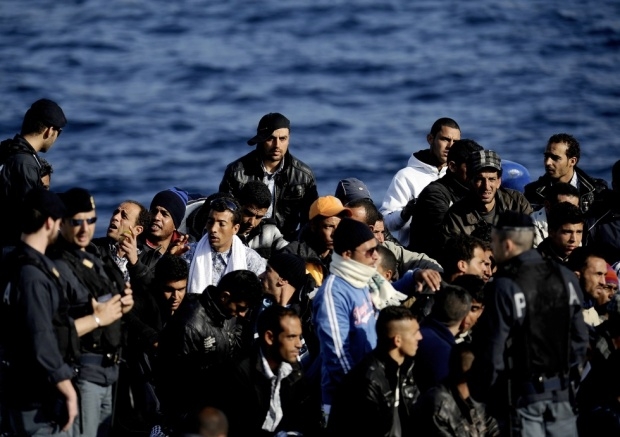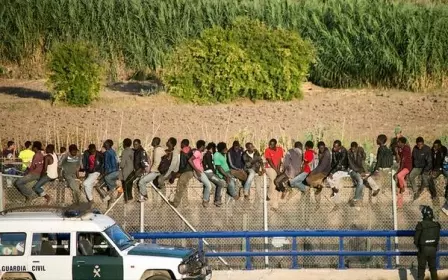No risk too great: Syrians take extraordinary measures to escape war

IZMIR, Turkey: Seated in the lobby of a budget motel in Izmir on Turkey's western coastline, Zein, a Syrian father of two from the embattled Western rebel-held neighbourhoods of Aleppo, rolled up the sleeves of his t-shirt to reveal angry red sunburn lines across his upper arms.
The burns were acquired after spending 12 hours on an ill-fated jet-ski trip to join another, larger smuggling boat that was to take him to Europe. The jet-ski stalled and sank and Zein nearly drowned before Turkish coast guards spotted the vessel. He was taken to hospital and questioned before signing a statement promising not to leave Turkey illegally again. Now, he plans to try once more.
Once a wealthy business owner in construction and manufacture, Zein left Aleppo with his wife and two young children, nine and seven, for Turkey after the family's home in Salaheddine was shelled to rubble by government forces. Leaving his mother and disabled brother at a shelter for internally displaced in Aleppo, he made the journey to find work and a better life in Turkey, hoping to return for them later. He borrowed all he could, he said, to set up a new home and found work in construction in Istanbul. But after months of not being paid by his Turkish employer, he said, he was left destitute.
Attempts to gain asylum in Sweden and Australia through embassies both proved futile.
In desperation, Zein turned to a smuggler he met through contacts with other refugees who had made the same perilous journey. Once again, Zein said, he found himself in debt; this time borrowing 2,300 euros ($3,000) to pay for his passage across turbulent waters to Greece. Once there, he said, he will apply for asylum immediately and apply to reunite with his wife and children, before bringing his mother and brother. In anticipation of finding work, Zein, who is illiterate, has started studying Greek.
As he waited for the call from the smuggler to tell him whether a second attempt would be made that night, Zein said he was aware of the dangers, and the chance he might never see his children again.
"I know the dangers, but I will try again. I will try again and again until I make it. This is the last chance for me to have a respectful life and a future for my children," he said.
Zein is one of around 25,000 Syrians who attempt the perilous journey from Turkey to Greece each year. The beautiful coastal resort city of Izmir has become a smuggling hub for Syrians fleeing by boat to Europe after Greece, overwhelmed by new arrivals, blocked the land route across the Evros river marking the Greek-Turkish border with a 12km fence.
The route from Izmir takes the boat people across a dangerous stretch of water, most often in small rubber boats that are less likely to be spotted by coast guards. Many don't make it.
In the worst accident to date, 61 people, mostly Syrians, died when their boat capsized off Izmir in September 2012. Highlighting the dangers and the scale of the problem, this week another boat carrying some 400 migrants sunk off the Libyan coast. Some 100 people are still missing. The total death toll for migrants crossing the Mediterranean this year alone has exceeded 1,900 people, according to the EU.
Noting the relatively small number of Syrians attempting to make it to Europe, compared to the overall number of Syrian refugees in neighbouring countries, Lebanon, Turkey, Jordan and Iraq, Sabine Klinglmair, director of general affairs and research at the International Centre for Migration Policy Development said that 25,000 refugees arrived to Greece by sea without entry visas in the first half of 2014 alone. Most were Syrian and Iraqi, and a large number came with families and children.
"This was approximately the same number as had arrived to Greece by sea throughout the whole of 2013," she told the Middle East Eye in an email.
"Some Syrians also travel as far as Egypt or Libya and make the crossing to Italy or Malta. The overall numbers of people registered as arriving by boat to Italy without entry visas during January to July 2014 was around 93,000, but this includes Afghans, Iraqis, Somalis, Eritreans and others, as well as Syrians."
A total of 25,500 Syrians were detected trying to enter the EU without entry visas during 2013, according to Frontex, the EU border agency.
Under the UN 1951 Refugee Convention and 1967 Protocol, a refugee is a person who, “owing to well-founded fear of being persecuted for reasons of race, religion, nationality, membership of a particular social group or political opinion, is outside the country of his nationality and is unable or, owing to such fear, is unwilling to avail himself of the protection of that country…”
Those that are deemed refugees have the right to seek asylum in any of the countries that are parties to the Convention and Protocol, including Turkey and all EU member states.
Under the Convention, if a Syrian's application is accepted, they are granted social rights in line with EU citizens, including the right to live and work in the EU for a specific length of time, and in most cases, they can eventually apply for citizenship. Sweden, which together with Germany has over half the number of Syrian refugees in Europe, last year granted all Syrian refugees permanent residence.
The average monthly number of applications by Syrian people has now stabilised at around 6,000 applicants a month, according to the International Centre for Migration Policy Development (ICMPD).
Nonetheless, EU countries, particularly Greece and Italy, are struggling to cope with the tidal wave of migrants following the so-called Arab Spring movements, prompting governments to take desperate measures.
Those migrants that make it risk being detained in detention camps while their applications are processed, or, if unsuccessful, await deportation. The camps are overcrowded and charity and human rights organisations have reported squalid conditions and the outbreak of disease. This year, an 18-month limit on detention in camp facilities in Greece was extended indefinitely.
And, while Greek authorities have reportedly denied it, the United Nations High Commissioner for Refugees (UNHCR) has registered concern over the increasing practise of "push backs," with Greek Coast Guards towing arriving boats back out to Turkish waters.
"I know of cases where the people have been towed back and even when the boats have been shot at from Greece. It is dangerous," said Zein.
Klinglmair said that while some initiatives, like Operation Mare Nostrum in Italy have been established to rescue migrants at sea, "we can still see the reports of the death of people in the Mediterranean every week."
And after repeated calls for assistance from Italy, the EU on Wednesday announced it will launch a “Frontex plus” mission in autumn to boost the Mare Nostrum operations in search and rescue off the Mediterranean for boat migrants.
Efforts to deal with the crisis last year saw the EU and Turkey sign the Readmission Agreement, which allows EU countries to send back immigrants who enter Europe from Turkey, and do not have entry visas. The law, however, will only come into force around three years from now and is not applicable for refugees.
"Speaking about migration in general - which should not be mixed up in the discussion with the current refugee situation of many Syrians - the Mobility Partnerships, [for instance] between the EU and Morocco, should lead to a closer cooperation between countries of origin and EU countries," Klinglmair said while also noting Turkey's "enormous efforts" in handling the situation.
"Refugee facilities have been set up where Syrian children have access to decent education, adults have access to vocational training and there is a local administration system set up to coordinate the communities within the facilities, with a view to their subsequent return to Syria or integration in Turkey," she said.
But for many, like Zein, the prospect of work in Europe is still better than a dependent and uncertain future in Turkey.
"I will work immediately if I can, but nothing is clear," he said.
"The first thing is to go to the UN and then reunite with my wife, my kids and my mother."
As of Thursday, MEE lost contact with Zein. He was understood to have taken the boat to Greece, but until now there has been no update on his situation and his family is still waiting to hear back if his latest attempt has finally succeeded.
New MEE newsletter: Jerusalem Dispatch
Sign up to get the latest insights and analysis on Israel-Palestine, alongside Turkey Unpacked and other MEE newsletters
Middle East Eye delivers independent and unrivalled coverage and analysis of the Middle East, North Africa and beyond. To learn more about republishing this content and the associated fees, please fill out this form. More about MEE can be found here.




